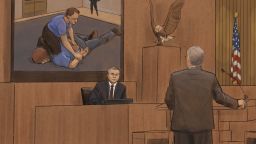Former Minneapolis police officer J. Alexander Kueng laughed at a joke made by Derek Chauvin while restraining George Floyd, according to testimony Thursday.
Citing body camera video transcripts, Assistant US Attorney Manda Sertich asked Kueng during cross-examination what he was laughing at on video. Kueng told the jury that a few days earlier, he and Chauvin had responded to an incident at a hospital involving a patient who was restrained and yelling that he could not breathe.
After a nurse had said, “it takes a lot of oxygen,” Chauvin said that he would use that line. Kueng referred to it as “a brief moment of levity.”

Chauvin knelt on Floyd for 9 minutes and 29 seconds.
Kueng is one of three officers – including Tou Thao and Thomas Lane – standing trial in federal court for violating Floyd’s civil rights.
All three are each charged with deprivation of rights under color of law while Chauvin restrained Floyd. Thao and Kueng are also charged with willfully failing to intervene in Chauvin’s use of unreasonable force, resulting in Floyd’s death.
The three have pleaded not guilty to the federal charges and are being tried together. Chauvin admitted guilt in December as part of a plea deal.
All three former officers will face a state trial later this year on charges of aiding and abetting in Floyd’s murder.
Kueng testified he could have performed CPR on Floyd
Sertich asked Kueng about the moments leading up to Floyd’s restraint and about his recollection of Floyd on the ground.
“I recall officer Chauvin saying we’re going to bring him down,” Kueng told the jury.
While displaying a Minneapolis Police Department training document titled “Conscious Neck Restraint,” Kueng said he had not been trained or aware of the “technique using the leg.”

“The senior officer must have been trained in it at some point,” Kueng continued, referring to Chauvin pressing his knee on Floyd’s neck.
Sertich then attempted to show a portion of Thao’s bodycam video showing the scene about one minute into Floyd’s restraint. Kueng’s defense attorney, Thomas Plunkett, objected to the use of bodycam audio, claiming it showed a perspective Kueng was not aware of at the time.
Sertich asked if Kueng could see that Floyd had stopped moving at some point.
“Yes, at some point,” he replied, adding that Lane had said Floyd was passing out.
Kueng defined it as a medical concern, but not a “serious medical need,” as Sertich referred to it.
Sertich asked if it’s fair to say that Kueng could have performed CPR in his position while on the ground.
Kueng agreed, saying that they could have uncuffed him and secured the scene. He added that the paramedic seemed “quite casual” when he arrived.
Kueng testified he had little experience handling large individuals
Kueng testified he had little experience handling large individuals resisting arrest before the fatal encounter with Floyd.
Citing a December 2019 call for service involving an intoxicated person striking people at a bar, Sertich asked Kueng if the man continued to resist arrest after being handcuffed.
“After he was handcuffed, that arrestee kept resisting right?” Sertich asked.
“I think so ma’am, to some degree, yes,” Kueng responded.
Sertich asked if he and the other two officers with him in 2019 tried to get the handcuffed subject into an upright position while he continued to resist arrest.
“Yes ma’am,” Kueng responded.


